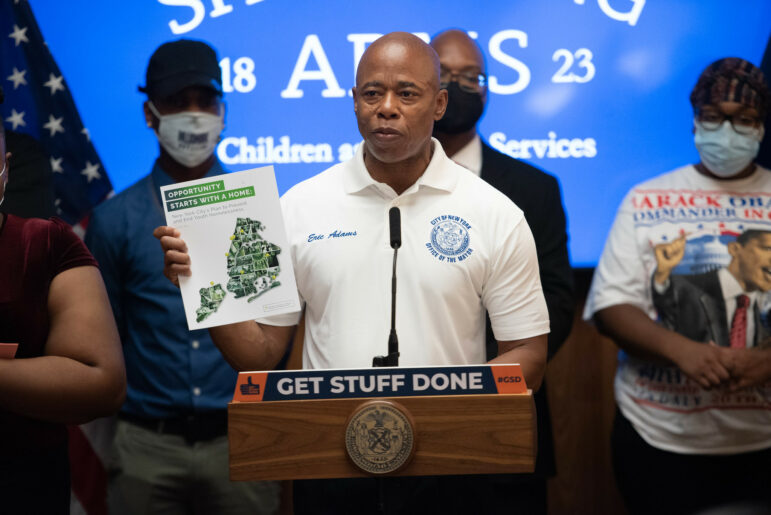“If Mayor Adams truly wants to make good on his promises to stem the homelessness crisis in the city and provide substantive mental health to the city’s youth, he must first make it easier, not harder, to access safe and affordable housing.”

Michael Appleton/Mayoral Photography Office
Mayor Eric Adams at a press conference about youth homelessness in August 2022.Six months ago, Mayor Eric Adams assured every young homeless person in the city that “we have your back, we’re looking out for you.”
And yet last month, the Department of Youth and Community Development (DYCD) told the city’s five overnight youth drop-in centers that youth would no longer be allowed to sleep—or even to rest—there.
Depriving homeless and street-involved youth of sleep is not only cruel, degrading, and inhuman, but results in a greater likelihood that such youth will suffer from untreated anxiety, depression, suicidal thoughts, and self-harm. It also increases the likelihood that youth will stay on the streets longer and lose access to life-saving services like warm meals, hot showers, clean clothing, and medical care.
The city’s policy to deprive children of sleep isn’t the only practice that keeps this population of youth unstable, unsafe, and anxious. The current administration, in the form of the Department of Social Services (DSS), is refusing to honor a 2021 law enacted to allow homeless youth to obtain housing subsidies without first entering adult shelters.
This lack of access to permanent housing has meant that nearly half of youth that leave a Runaway Homeless Youth (RHY) program in the city end up in another homeless situation. Despite this promising solution to address the homelessness crisis in the city, and to create stability for a vulnerable population, the Adams administration’s actions seem intent on derailing the legislation.
The zealous insistence by the Adams administration to ignore the enforcement of positive policies in favor of those that are harmful demonstrates a hostility and heartlessness towards a group of youth already struggling to get by every day.
At the Peter Cicchino Youth Project, we know how precarious the lives of our clients are, and we strive to help interrupt the cycles of poverty that stand in the way of young people living fulfilling lives free from discrimination, abuse, and oppression.
It’s no secret that homeless youth often struggle to complete an education, obtain life skills, or maintain employment. And the 40 percent of homeless youth who identify as LGBTQ+ are also significantly more likely to experience bullying, sexual assault, violence, trauma, HIV infection, and substance abuse than either heterosexual or stably housed LGBTQ+ peers.
If Mayor Adams truly wants to make good on his promises to stem the homelessness crisis in the city and provide substantive mental health to the city’s youth, he must first make it easier, not harder, to access safe and affordable housing. It would take little effort to rescind the directive to DYCD that denies youth the chance to rest at drop-in centers, and to instruct the Department of Homeless Services (DHS) and Department of Social Services (DSS) to uphold Local Laws 170 and 157 to help youth transitioning out of shelters.
These small steps will restore the dignity of so many young people who are facing an unstable situation, and also will go a long way towards making sure that young New Yorkers have the options they need to feel safe and supported as they navigate the world.
Amy Leipziger is the project director of the Peter Cicchino Youth Project of the Urban Justice Center. PCYP works to ensure that homeless and street involved youth have access to food, shelter, healthcare, legal immigration status, and education.








